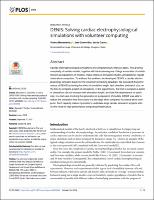Please use this identifier to cite or link to this item:
https://repositorio.usj.es/handle/123456789/268
| Title: | DENIS: Solving cardiac electrophysiological simulations with volunteer computing |
| Authors: | Monasterio, Violeta



Castro Mur, J. Carro, Jesús 


|
| Keywords: | Cellular electrophysiology; Variability; Equations; Dynamics; Models |
| Issue Date: | 16-Oct-2018 |
| Publisher: | Alexander V. Panfilov, Universiteit Gent, BELGIUM |
| Citation: | Monasterio V, Castro-Mur J, Carro J (2018) DENIS: Solving cardiac electrophysiological simulations with volunteer computing. PLoS ONE 13(10): e0205568. https://doi.org/10.1371/journal.pone.0205568 |
| Abstract: | Cardiac electrophysiological simulations are computationally intensive tasks. The growing complexity of cardiac models, together with the increasing use of large ensembles of models (known as populations of models), make extensive simulation studies unfeasible for regular stand-alone computers. To address this problem, we developed DENIS, a cardiac electrophysiology simulator based on the volunteer computing paradigm. We evaluated the performance of DENIS by testing the effect of simulation length, task deadline, and batch size, on the time to complete a batch of simulations. In the experiments, the time to complete a batch of simulations did not increase with simulation length, and had little dependence on batch size. In a test case involving the generation of a population of models, DENIS was able to reduce the simulation time from years to a few days when compared to a stand-alone computer. Such capacity makes it possible to undertake large cardiac simulation projects without the need for high performance computing infrastructure. |
| URI: | https://repositorio.usj.es/handle/123456789/268 |
| ISSN: | 1932-6203 |
| Appears in Collections: | Artículos de revistas |
Files in This Item:
| File | Description | Size | Format | |
|---|---|---|---|---|
| journal.pone.0205568.pdf | 963,11 kB | Adobe PDF |  View/Open |
This item is licensed under a Creative Commons License

